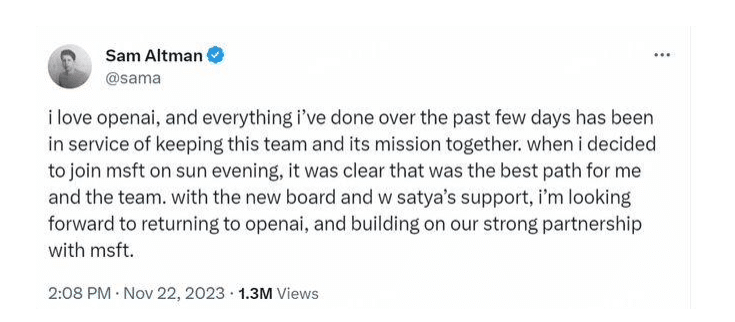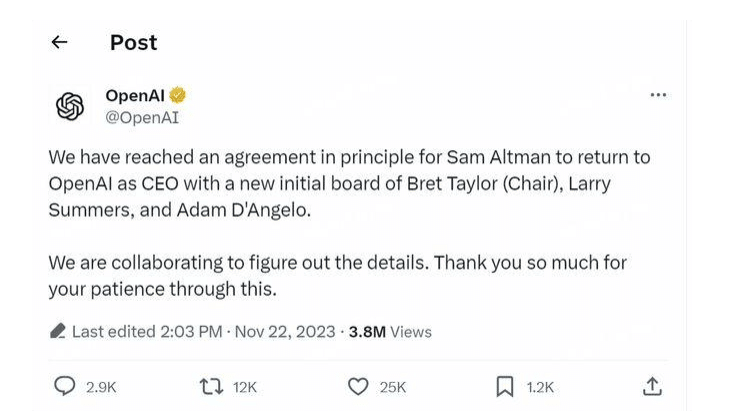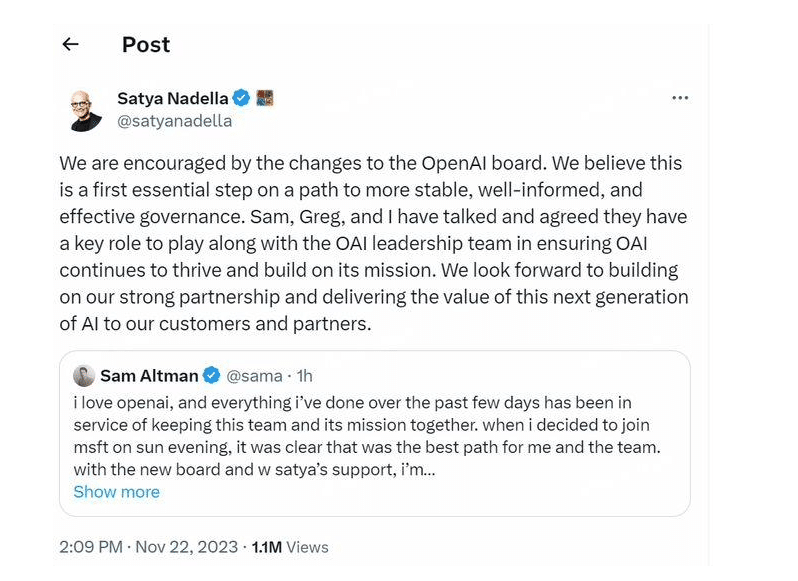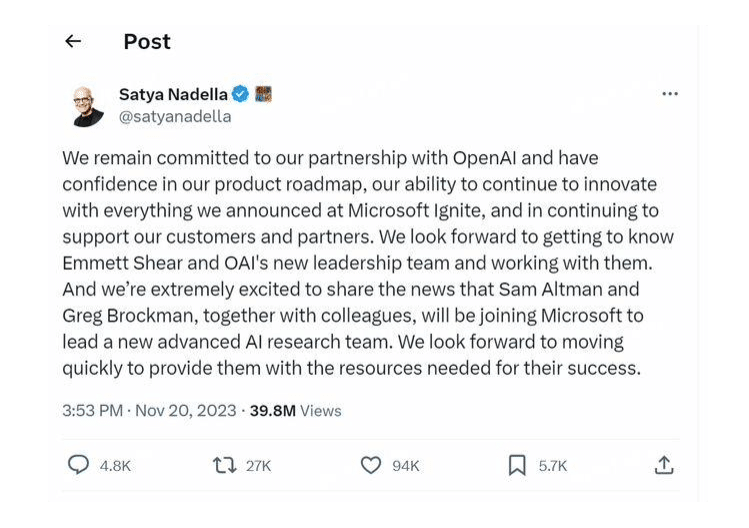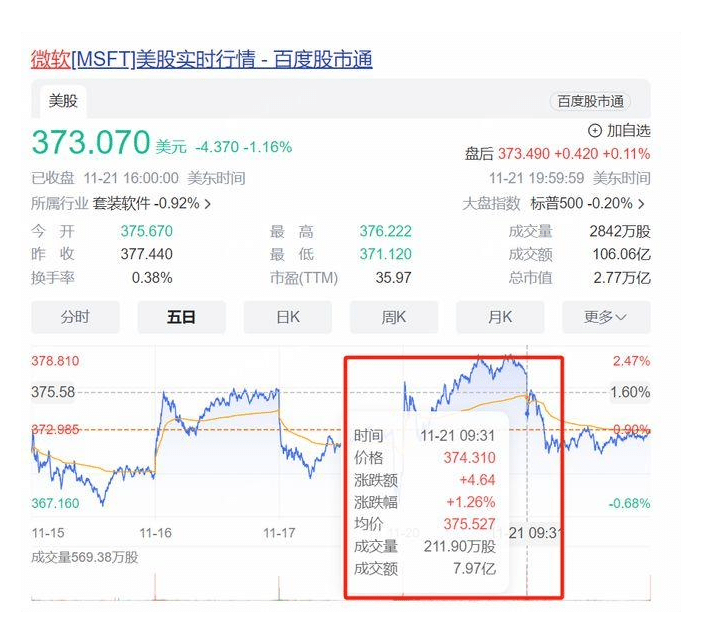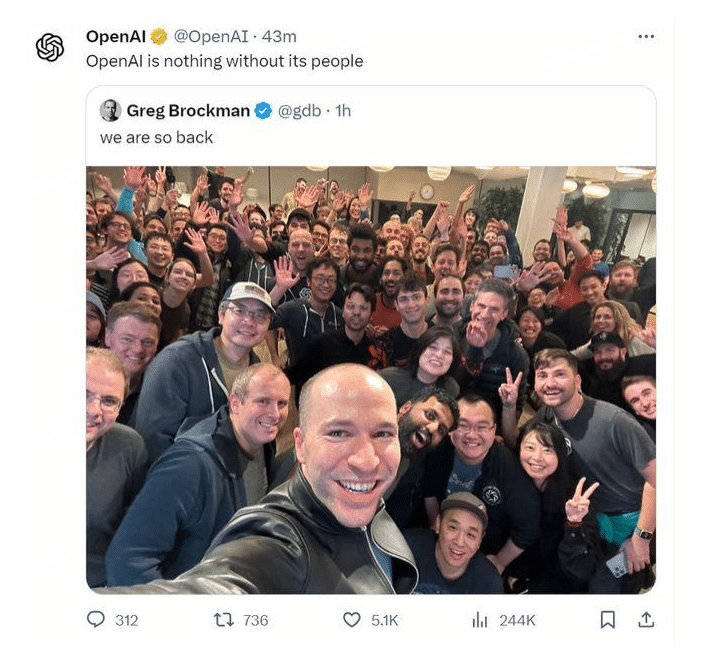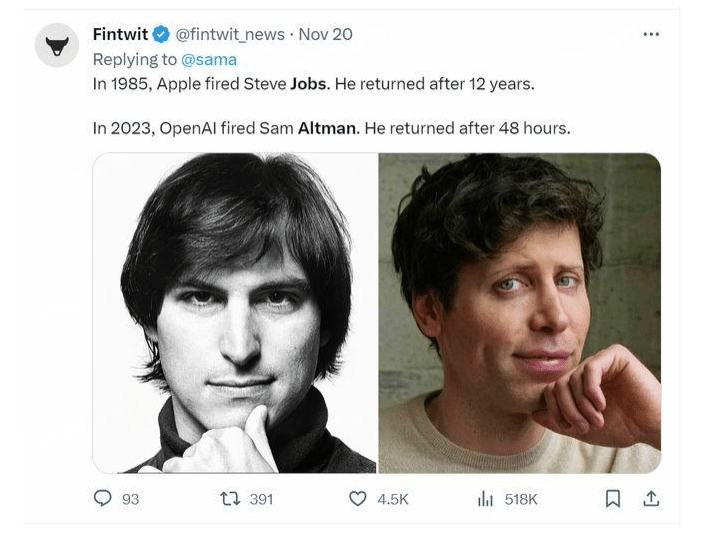Back to OpenAI and establishing a solid partnership with Microsoft is eagerly anticipated. OpenAI founder Sam Altman’s tweet this afternoon, in Beijing time, seems to mark a temporary conclusion to the recent “power struggle drama.” After 120 hours, Sam Altman returns to OpenAI and concludes the “drama” or marks its prologue.
In response to OpenAI’s statement this afternoon, Altman’s return as CEO is framed as a resolution to the recent upheaval. In contrast to the stance on the 17th, OpenAI claims to have reached a preliminary agreement, forming a new initial board including Bret Taylor (board chair), Larry Summers, and Adam D’Angelo. The irony of the board expressing a lack of confidence in Altman’s leadership abilities in the statement on the 17th is evident, as within a mere 120 hours, OpenAI undergoes a significant transformation akin to a Silicon Valley “face-changing opera.”
Microsoft’s current CEO, Nadella, responds to Altman’s return, expressing encouragement for the changes in OpenAI’s board. He sees this as the first step towards more stable, sensible, and effective governance.
Following the recent upheaval at OpenAI, the future direction remains uncertain, but the changes may bring about a more stable internal structure. Nadella’s positive assessment may stem from the fact that Microsoft seems to be the one “winning” in this “drama.”
In the five-day “power struggle” at OpenAI, Microsoft strategically seizes every crucial moment, reaping benefits from the unfolding “drama.”
On November 17th, Nadella promptly announced a long-term agreement with OpenAI and committed to ongoing collaboration. Insider sources reveal that Microsoft devises measures to salvage the situation, formulate a contingency plan for Altman, and establish a new department for top OpenAI researchers within Microsoft.
At midnight on the 19th, Nadella announces Altman, Greg Brockman, and their colleagues joining a new AI research team led by Microsoft. Altman confirms this, and Nadella extends an olive branch to other OpenAI members, offering necessary resources if they choose to join.
With this news, Microsoft’s stock prices surged again, showing a continuous upward trend from the 19th to the 21st. On the 20th, the market value increased by $57 billion overnight. Analysts suggest that hiring Altman is the best move for Microsoft shareholders.
Although Microsoft didn’t achieve a “zero-dollar acquisition” of OpenAI this time, inviting Altman and his team is considered a strategic “stop-loss” measure. Since 2019, Microsoft has invested a cumulative $13 billion in OpenAI. The swift intervention is Microsoft’s optimal strategy, given the internal turmoil at OpenAI.
Even though this “drama” seems to have concluded, the partnership between Microsoft and OpenAI might undergo reshaping. Microsoft might realize that despite substantial investments in OpenAI, they lack sufficient control and influence. This event also damages OpenAI’s reputation and credibility, raising questions about its stability and long-term development.
Simultaneously, OpenAI announces the formation of a new board, featuring diverse members such as Bret Taylor, Larry Summers, and Adam D’Angelo. This diversity contrasts with the previous board. Taylor, a former executive at Salesforce and Twitter board chair during Musk’s acquisition, adds a varied background. Larry Summers served as the U.S. Treasury Secretary and Harvard University president, while Adam D’Angelo is the CEO of Quora and Poe.
Speculation arises, suggesting Adam D’Angelo might be the instigator of this “drama” due to his leadership in the Poe project, an AI platform allowing interaction with various models, including OpenAI’s GPT series.
In this context, whether the “drama” at OpenAI concludes or opens a new chapter remains uncertain. However, forming a new board and reappointing Sam Altman as CEO may bring fresh management perspectives and decision-making processes.
Considering the active involvement of employees in this upheaval, especially in signing joint letters expressing dissatisfaction with the original board, internal factions may emerge. After such significant internal changes, OpenAI may reevaluate its business model and product development strategy, including the progress of training GPT-5.
Is Sam Altman, the “Steve Jobs” of the AI era, starring in a Silicon Valley saga reminiscent of “Zhen Huan Zhuan”?
History often repeats itself, and at the moment of Altman’s “dismissal,” some liken him to the “Steve Jobs” of the AI era. Both as co-founders, they were ousted from their companies only to return eventually.
As one of Apple’s co-founders, Steve Jobs played a crucial role in the early success of the company in the late 1970s and early 1980s, particularly through the innovation of the Macintosh computer. Despite Jobs’ reputation for innovation and foresight, his management style sparked controversies, leading to continuous internal conflicts.
In 1985, Jobs’ relationship with then-Apple CEO John Sculley deteriorated. Attempting to alter Sculley’s leadership position, Jobs’ actions resulted in failure, leading to a loss of trust from the board and ultimately supporting Sculley.
Jobs advocated for ongoing product innovation and high-risk strategies, while Sculley and the board leaned towards a more conservative approach focused on profit and market share. This strategic disagreement was a significant factor in Jobs’ dismissal. Over thirty years later, a similar divide between “radicals” and “conservatives” unfolds internally at OpenAI, becoming the catalyst for Altman’s “dismissal.”
After being ousted from Apple, Jobs founded NeXT Computer and invested in Pixar, eventually returning to Apple in 1997 after twelve years. In contrast, Altman’s return to OpenAI takes only 120 hours.
Examining Silicon Valley’s technological history, numerous similar events unfold, shaping not only individual legends but also witnessing the evolution of the entire technology industry. Yang Zhiyuan and Jerry Yang left Yahoo, HP’s board ousted Caro Fiorina in 2005, and Jack Dorsey resigned twice as Twitter’s CEO. These significant events reshaped the destinies of their respective companies and reverberated throughout Silicon Valley and the global tech industry. These “Silicon Valley dramas” not only impact the careers of those involved but also reflect an enduring truth: in the tech industry, the only constant is change itself.
Read Also: Sam Altman Returns to Lead OpenAI as CEO, Board Announced!
